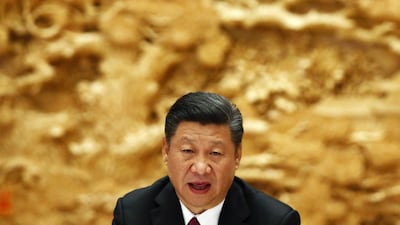This year is shaping up to be a tough one for China's international reputation. The glow of the 19th National Congress of the Communist Party last October has long worn off. Then, President Xi Jinping emerged all-powerful. The political theory known as "Xi Jinping Thought" was officially added to the party's constitution, as was Mr Xi's signature Belt and Road Initiative (BRI). Term limits to his position were subsequently abolished, meaning that he could remain as the country's leader indefinitely, and not from behind the scenes in the manner of Deng Xiaoping, but officially. A country or leader who had made a bet on closeness to the Chinese president appeared to have chosen wisely.
Nearly a year later, as I wrote last week, there has been a barrage of criticism over the BRI, with the principle charge being that the $1 to $8 trillion infrastructure plan was a form of “debt trap diplomacy”, by which unwary countries could be enticed to take on huge debts to build shiny new railways and ports, then find themselves in China’s pockets when they can’t keep up with the payments.
Reports of Muslim Uighurs suffering terrible mistreatment in the north-western autonomous region of Xinjiang have seriously troubled many around the world. Others have warned darkly of China's participation in Vostok 2018, Russia's largest military exercise since the Cold War. Word has leaked out of a recent secretive gathering of China's top leadership at which criticism was aired about the country's stance, suggesting it had been too aggressive in vaunting its achievements and its trajectory towards becoming a global superpower – perhaps even the global superpower.
All of which prompts the conclusion that China is losing the war of perceptions, and badly. Now, it may well be true that part of the criticism comes from those who believe that liberal democracy is the only legitimate form of government, and therefore judge China harshly because it is not one, and shows no signs of moving in that direction. There are also those who – whether they admit it or not – are uncomfortable that the era of Western dominance is coming to an end, and regard as upstarts any Asian countries that dare to develop to the point that they threaten to surpass Europe and North America, whether those states are in the Arabian Gulf or in the Asia Pacific region.
There are even some who argue that China should be “contained”. I not only regard that as being preposterous – the country’s rise is inevitable – but also profoundly arrogant. Who has the right to try to put a limit on its peaceful ambitions?
But even if we exclude the above objectors on the grounds of their reasoning or their motives, it remains true that China is not doing a very good job of making its own case. Yes, Chinese delegations, academics, think tank directors and diplomats permanently tour the world trying to reassure countries of their good intentions. I have lost count of the number of times I have heard the term "win-win cooperation" over the last few years. But these ambassadors for their country face a lot of scepticism.
As it happens, there were two Chinese professors at a conference on the BRI I attended in Dhaka last week. Hosted by the Bangladesh Institute of Peace and Security Studies, the pair were polite, friendly and open, and their presentations stressed China’s desire for genuine partnership. I was willing to take their statements at face value, and the mood in Dhaka struck me as far more positive about the BRI than it is in south-east Asia – albeit with an acknowledgement that projects must be approached in a hard-headed and outcome-centred manner.
But what surprised me was a presentation by a Sri Lankan researcher who, of course, mentioned the Hambantota port, which the country's government had to hand to China on a 99-year lease after overloading on debt. But she also talked about the Colombo International Container Terminal (CICT). Built and majority-owned by a Chinese firm in partnership with Sri Lanka, CICT has been a tremendous success story.
A world-class facility that is expected to propel Colombo port into the top 20 ranks of global container ports, it achieved 28 per cent growth in volume in its second year of operation alone, and contributed to Colombo being the fastest-growing port in the world in the first half of 2018. It has also been a pioneer in its use of green and solar technology. In short, it ought to be a poster child for the BRI and China’s engagement abroad. But it was the first I’d heard of it, and I have not seen any reference to it in the tidal wave of articles criticising the initiative. Neither is the number of jobs that the BRI could create regularly reported. If that figure is estimated to be one million for Pakistan alone, how many more millions could it lead to?
As Madhu Raman Acharya, another speaker at the conference and the former Nepalese foreign secretary, put it: “The Chinese are coming – but maybe they’re coming to our rescue!” Mr Acharya may be of that view, but such positive views are near-absent in the narrative around China at the moment. Why is the country not trumpeting them from the rooftops? The leadership in Beijing may feel that the scepticism is unjustified, and may be aggrieved at the criticism they are receiving from so many quarters.
What is odd, however, is that they do not appear to be using the tools that they have to fight back. They are in a public relations war, whether they like it or not. If China does not step up its game, its global narrative will be defined by its enemies – which would be a curiously passive stance for a country on the verge of returning to greatness.
Sholto Byrnes is a senior fellow at the Institute of Strategic and International Studies Malaysia


